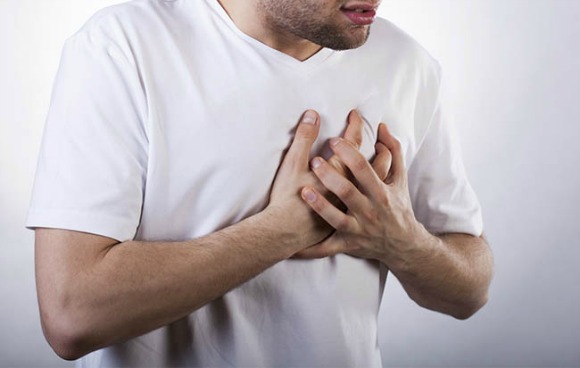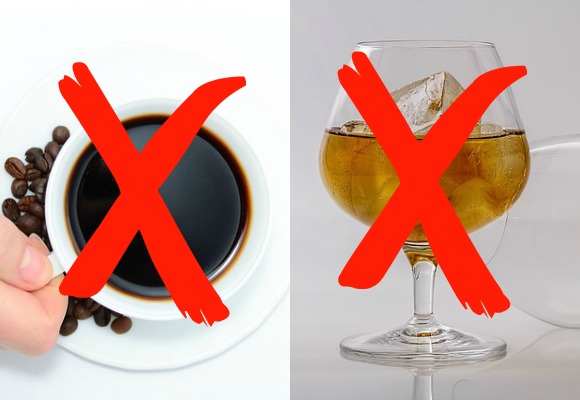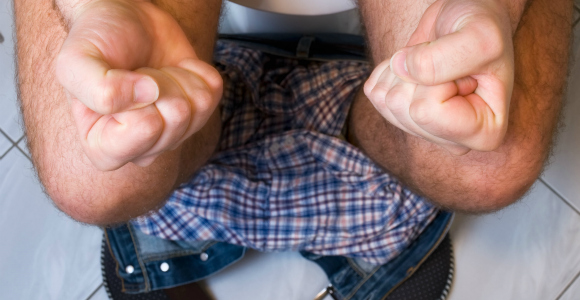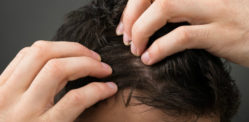Constipation is not necessarily a sign of getting older.
Diarrhoea, heartburn, stomach pain and constipation.
Many men know the misery of digestive problems all too well.
By some estimates, 25 per cent of adults suffer pain and discomfort from digestive issues.
While some such as irritable bowel syndrome are more prevalent among women, others hit men harder.
We take a look at some of the most common digestive problems for men and recommend effective remedies for relief.
1. Acid Reflux and Gerd

Acid reflux is the result of stomach acid flowing up into the esophagus. It can cause burning pain under the breastbone, a bad taste in the mouth, and sometimes regurgitation.
The discomfort of acid reflux can differ and it all depends on what you eat.
It usually occurs after heavy meals, caffeinated drinks, and alcohol. Lying down too soon after eating can be when you feel the pain the most.
Acid reflux is also referred to as heartburn. It is caused by a lazy or confused sphincter, the muscle that separates the esophagus and stomach.
To help prevent the pain of acid reflux, steer clear of greasy and spicy foods, chocolate, caffeine, and alcohol. Also, be sure to eat dinner two hours or more before bedtime.
 If you have acid reflux occasionally, try taking chewable antacids or over-the-counter acid reducers, such as histamine-2 blockers, Zantac, Pepcid and Prilosec (Omeprazole).
If you have acid reflux occasionally, try taking chewable antacids or over-the-counter acid reducers, such as histamine-2 blockers, Zantac, Pepcid and Prilosec (Omeprazole).
But if it flares up more than twice a week, immediately see your doctor as you may be suffering from gastroesophageal reflux disease (Gerd).
If left untreated, it can increase the chances of getting oesophageal cancer.
Treatment often involve prescription medication, along with lifestyle changes. In some extreme cases, surgery may be required.
2. Ulcers

Ulcers are painful open sores that develop on the stomach or duodenum (the upper part of the small intestine).
For unknown reasons, ulcers occur more frequently in men. This is especially true of duodenal ulcers.
Hassan, a medicine student, says: “They’re twice as common in men, my male friends often suffer from them and they are very horrific.”
The most common reported ulcer symptom is a gnawing pain in the abdomen, which can wake you up from sleep.
In the past, ulcers were incorrectly thought to be caused by stress.
They are in fact caused by a certain type of bacteria, as well as overuse of pain killers, like aspirin and ibuprofen.

Be sure to see your doctor if you suspect an ulcer is forming. If left untreated, digestive juices and stomach acid can eat a hole in the intestinal lining, causing unbearable pain that may require hospitalisation or surgery.
Prescription medication can help heal ulcers, but it may take several months.
Or as Hassan suggests: “For day-to-day relief, eat small meals throughout the day (ulcers hurt less when there’s food in your stomach) and nix the ibuprofen and aspirin.”
3. Constipation

If all your time is spent by going in and out the bathroom, you’re likely to have constipation.
Despite widespread belief, constipation is not necessarily a sign of getting older.
The main symptom is the absence of bowel movements for days on end, while feeling uncomfortably full.
Constipation can be caused by diet (usually not enough fibre), lack of activity, side effects of medication, and sometimes stress.
Try using a laxative or stool softener to ease constipation. Avoid regular use or your bowels can become dependent on it, making the constipation worse.

Increasing your fibre intake also does the trick, as Hafiz, a medicine student, explains: “Fibre adds bulk to stool, helping it move through your intestines and out of your body.”
Good sources of fibre include bran and bran cereals, whole wheat bread, nuts, beans, fruits, and vegetables.
Aim for 38 grams of fibre per day if you’re 50 or younger, or 30 grams if you’re older.
Exercising and drinking plenty of water can also help relieve constipation.
If your stomach looks swollen or you experience severe pain, consult your doctor instantly as this could indicate a more serious digestive issue..
4. Food Poisoning

Stomach cramps/pains, diarrhoea, nausea, and vomiting that come on 24 to 72 hours after eating could point to food poisoning.
The major cause of food poisoning is bacteria in food, usually salmonella, campylobacter, or E. coli. The best treatment for food poisoning is time.
Safina, a biology student, tells us:
“Most adult men recover in a day or two without any treatment as the toxins are flushed from the body.”
Skip diarrhoea medications like Imodium (loperamide) and Kaopectate (bismuth subsalicylate), and make sure to check with your local GP to confirm that it’s food poisoning.
If you can keep anything down, sip clear liquids, especially sports drinks, to prevent dehydration.
However, if you’re still camping out in the bathroom after 48 hours or develop a fever, you could have a more serious bacterial infection. Immediately consult a doctor in this instance.
 While digestive issues are no fun, they are usually mild and easily treatable. Always see a doctor if symptoms persist for more than a week.
While digestive issues are no fun, they are usually mild and easily treatable. Always see a doctor if symptoms persist for more than a week.






























































